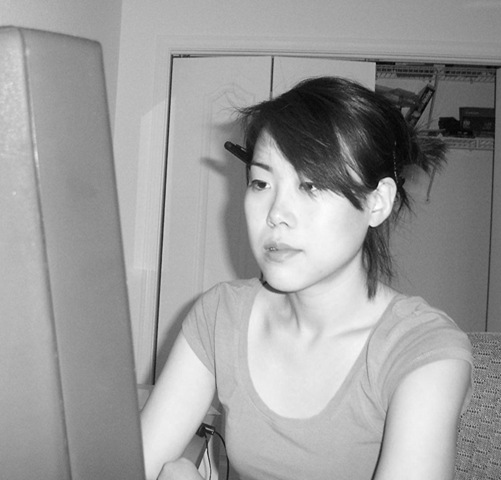Mixing Bowl
*
Mother sits in the middle of the linoleum, legs splayed, and cradled between her knees is a bowl. I walk past and familiar smells seep in: the mellow twang of cabbage, the sharp sulfur of onions, spicy red chili powder, aromatic garlic and something salty, like fish sauce. I ask my mother if she is making kimchee, and she shakes her head, smiling. She tells me she is pickling my father. “A bad man,” she adds.
***
A month ago, my father came home much later than usual. I could see little drops of sweat already beaded upon his forehead. He sat down on the couch, next to me, and groped in his briefcase for a pack of cigarettes. Mother left the room; she hated the smell of cigarette smoke. He lit one and inhaled slowly. He said something in Korean, but I couldn’t understand what he was saying.
“Give your father a hug.” This time in English.
I hesitated, but he had already wrapped his arms around me, pressing me close to him, suffocating me with sweat and whiskey and smoke. Something else too, a quiet gauze of an unknown perfume, soft and fluttery and not at all like my mother, who I could hear crying from the bedroom.
***
On the table are vegetables, all sliced and chopped in different sized cubes. My mother puts aside her bowl and rinses her hands underneath the tap. Moments later she is mashing cloves of garlic and cutting shreds of gingerroot and retrieves a second mixing bowl from the small shelf above the stove. She adds soy sauce to the bowl, a dash of sesame oil and a rich, nutty, brown aroma fills the small space above the counter top. I”m standing here, watching her add a couple shakes of salt, a spoonful of sugar, the garlic and gingerroot to the dark brown liquid pooling at the bottom of the mixing bowl. I can see she is making a marinade and I ask her where the meat is. She shakes her head and begins chopping some scallions. She repeats “him, him, him,” under her breath in her native tongue, as the blade comes quickly at the shreds.
***
For two weeks now we have been eating my father, just a slice or two at dinnertime. All his clothes and toiletries and shoes are gone. His car, too. Mother spent three days tearing up photographs, throwing out his old college textbooks. I almost cried when she ripped off the small golden cross from my throat, a 13th birthday present from him. She stared at me with her red-rimmed eyes, “Filth!” she shouted angrily in Korean. My father was gone — every remnant of him broken or torn or smashed or thrown away, and the only time I knew I’d see him again was at dinner.
***
About the Author
 Hanna Ahn is currently completing her B.A. in Rhetoric and English from the University of Illinois at Urbana-Champaign.
Hanna Ahn is currently completing her B.A. in Rhetoric and English from the University of Illinois at Urbana-Champaign.
